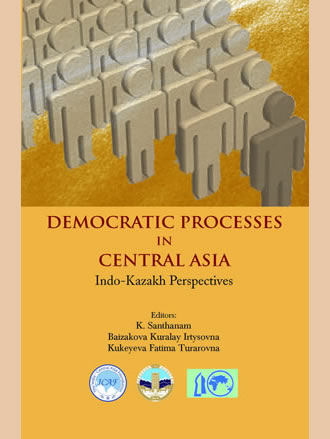DEMOCRATIC PROCESSES IN CENTRAL ASIA: Indo-Kazakh Perspectives
DEMOCRATIC PROCESSES IN CENTRAL ASIA: Indo-Kazakh Perspectives is backordered and will ship as soon as it is back in stock.
Couldn't load pickup availability
Genuine Products Guarantee
Genuine Products Guarantee
We guarantee 100% genuine products, and if proven otherwise, we will compensate you with 10 times the product's cost.
Delivery and Shipping
Delivery and Shipping
Products are generally ready for dispatch within 1 day and typically reach you in 3 to 5 days.
- Pages: xx + 196
- Format: Hard Bound
- ISBN: 9788173053719
- Edition: 1st Edition
- Publisher: Aryan Books International
- Size: 15 cm x 22 cm
- Product Year: 2009
This book is a joint research product of scholars from India and Kazakhstan and focuses on democratic processes in Central Asia in general and Kazakhstan in particular. It contains a detailed examination of constitutional and political systems in Kazakhstan, inter-regional cooperation between Central and South Asia. India and Kazakhstan are poised to play significant roles in international affairs and the book advances knowledge in understanding how and why these developments have occurred. This compendium provides valuable and timely insights into the contours of their foreign policies and emerging trends of importance to students and scholars of regional and international affairs around the world. The book pays special attention to political transformations in Kazakhstan while surveying traditional legal institutions of nomads of Eurasia. The book aims at enabling a better understanding of Indo-Kazakh relations through scholarly exchanges and sharing of perceptions in the gamut of politico-economic-nation building matters faced in the region. ICAF and DIR of the Al-Farabi Kazakh National University hope that this book would contribute towards a greater and enlightened appreciation of democratic processes in Central Asia, Indo-Kazakh relations and advance common interests in Central Asia and other regions. Both believe that this book would be of use at the Track I and Track II levels of engagement. It is likely to be of direct interest to scholars, policy makers, diplomats, entrepreneurs, academics and decision makers in both countries as well as those with a general interest in Central Asia ? a region which has assumed a higher importance in recent times.





